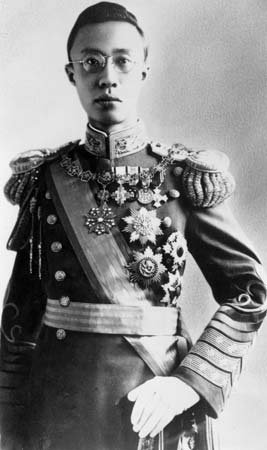Puyi
emperor of Qing dynasty
Wade-Giles romanization P'u-i, also called Henry Puyi, reign name Xuantong
born Feb. 7, 1906, Beijing, China
died Oct. 17, 1967, Beijing
 last emperor (1908–1911/12) of the Qing (Manchu) dynasty (Qing dynasty) (1644–1911/12) in China and puppet emperor of the Japanese-controlled state of Manchukuo (Chinese: Manzhouguo) from 1934 to 1945.
last emperor (1908–1911/12) of the Qing (Manchu) dynasty (Qing dynasty) (1644–1911/12) in China and puppet emperor of the Japanese-controlled state of Manchukuo (Chinese: Manzhouguo) from 1934 to 1945.Puyi succeeded to the Manchu throne at the age of three, when his uncle, the Guangxu emperor, died on Nov. 14, 1908. He reigned under a regency for three years, and then on Feb. 12, 1912, in response to the Republican Revolution of the previous year, he was forced to abdicate, ending the 267-year Qing rule of China and the 2,000-year-old imperial system. He was permitted to continue living in the palace in Beijing. Puyi chose Henry as a given name and was thereafter known as Henry Puyi in the West. In 1924 he secretly left Beijing to reside in the Japanese concession (colony) at Tianjin. On March 9, 1932, he was installed as president, and from 1934 to 1945 was emperor of the Japanese puppet state of Manchukuo in Manchuria (China's Northeast) under the reign title of Kangde. At the end of World War II he was taken prisoner by the Russians (August 1945) and returned to China for trial as a war criminal in 1950. He was pardoned in 1959 and went again to live in Beijing, where he first worked in the mechanical repair shop of a botanical garden and later became a researcher in the institute of literature and history under the Chinese People's Political Consultative Conference. His autobiography, From Emperor to Citizen, was published in English in 1964–65, and he was the subject of the 1987 biopic The Last Emperor.
- Hulme, T.E.
- Hulse, Russell Alan
- Hulst, Hendrik Christoffel van de
- Hulun, Lake
- Humacao
- human aging
- human behaviour
- human being
- human body
- human cardiovascular system
- human development
- human digestive system
- human disease
- Human disorders attributable to a single dominant gene
- Human disorders attributable to a single pair of recessive genes
- Human disorders attributable to multifactorial inheritance
- Human disorders attributable to sex-linked recessive inheritance
- human ear
- human ecology
- human embryology
- human endocrine system
- human evolution
- human eye
- human-factors engineering
- human genetic disease